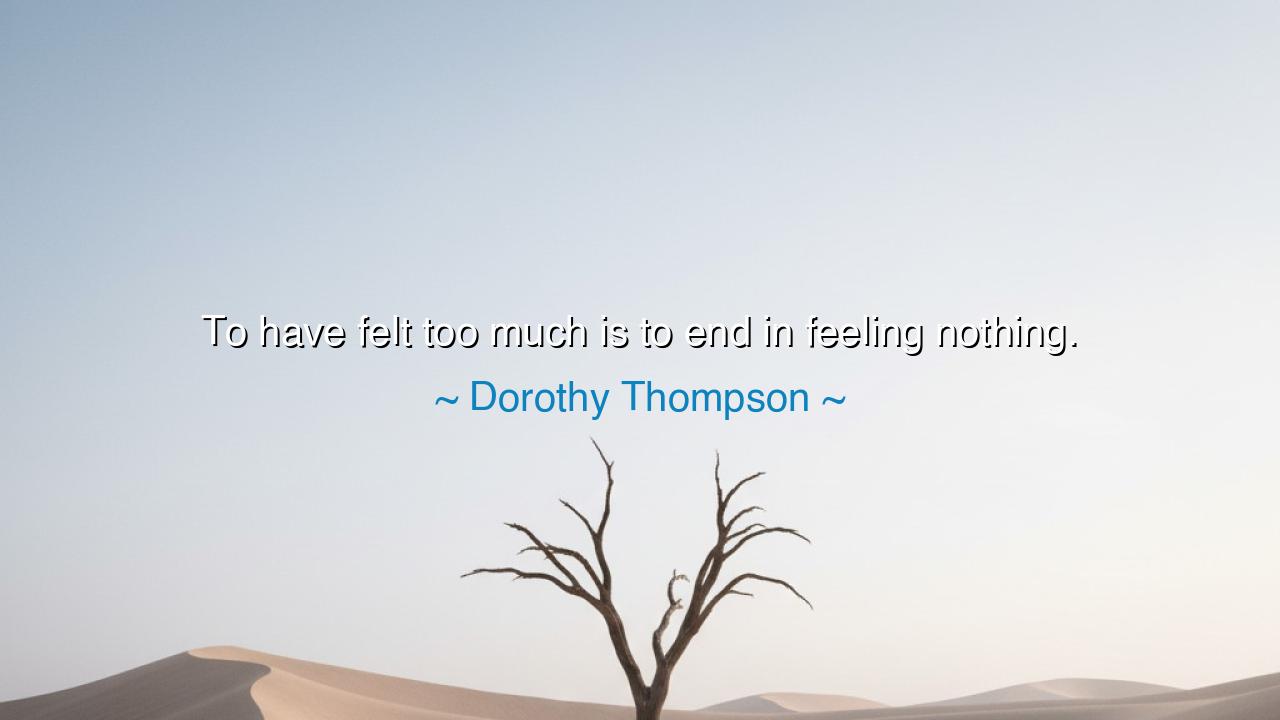
To have felt too much is to end in feeling nothing.






The words of Dorothy Thompson, “To have felt too much is to end in feeling nothing,” are carved from the stone of human experience. They speak of the fragile balance between emotion and endurance, between the heart that burns too brightly and the one that turns to ash. Within these few words lies an ancient warning: that even the deepest well can run dry, and that the soul, when overwhelmed by feeling, may seek refuge in numbness. It is not the absence of care that Thompson laments, but the exhaustion of it — the moment when the spirit, having carried too much sorrow, too much passion, too much empathy, can no longer bear its own weight.
Dorothy Thompson herself was a woman forged in fire. As one of the most influential journalists of the 20th century, she witnessed the rise of tyranny, the collapse of nations, and the sufferings of countless lives during the shadow of war. Her heart was vast, her conscience awake, but even she came to see that to feel everything too deeply — to carry the world’s anguish in one’s own breast — can harden the heart instead of softening it. In her words we hear the echo of weary souls throughout history, those who have stood too long in the storm and lost the ability to weep.
The ancients spoke of this truth in their own language. The Stoics warned that excess in all things leads to ruin, even in feeling. They taught that emotions are sacred, but when ungoverned, they consume their bearer. Like a flame that burns too hot, it devours the vessel that holds it. To feel too much is to live at the edge of despair — for joy, love, and grief become so intense that the heart, unable to contain them, closes itself for protection. This closing is not death, but a form of survival — the soul’s desperate attempt to shield itself from the very beauty and pain that once gave it life.
Consider the life of Vincent van Gogh, the painter whose art poured with the radiance and anguish of his own heart. He felt the world with unbearable clarity — every color was a cry, every landscape a prayer. Yet that same intensity that gave birth to genius also consumed him. His feelings, unchecked and overflowing, led him into the darkness of isolation and despair. In the end, he could no longer bear to feel at all. His story, like Thompson’s words, reminds us that the heart must learn to breathe, or else it will suffocate beneath its own emotion.
There is, however, not despair but wisdom in Thompson’s observation. She does not tell us to stop feeling; she tells us to guard the heart with understanding. To feel deeply is a gift — it connects us to humanity, to love, to truth. But to feel endlessly, without balance, is to risk losing the ability to feel at all. Like the tide that must ebb before it returns, the heart too must learn rhythm — the dance between empathy and rest, passion and reflection. The ancients would have called this temperance, the virtue that preserves the soul from both cold indifference and destructive intensity.
This truth also speaks to our own age, where the flood of emotion and information never ceases. Every day the human spirit is battered by images of joy and suffering, love and loss, injustice and beauty. Many grow numb not because they do not care, but because they have felt too much for too long. The constant weight of the world’s pain exhausts the heart’s capacity. Yet in remembering Thompson’s wisdom, we are reminded to retreat, to find silence, to replenish the inner flame before it burns out entirely.
So let the lesson be this: feel deeply, but wisely. Let your compassion be strong, but not self-consuming. When sorrow overwhelms, step back into the stillness; when passion overflows, temper it with peace. The heart, like the body, needs rest to remain whole. Remember that numbness is not the absence of emotion, but the cry of a soul that has been asked to feel beyond its limit. To live well, then, is to honor both the depth of feeling and the discipline of peace.
Children of tomorrow, hear this truth: feeling is the light of life, but even light must learn to rest in shadow. Do not strive to feel all things at once, nor close your heart in fear of pain. Instead, let your emotions flow in harmony, as rivers flow to the sea — steady, balanced, eternal. For as Dorothy Thompson teaches, to have felt too much may lead to emptiness, but to feel with wisdom is to live with grace.






AAdministratorAdministrator
Welcome, honored guests. Please leave a comment, we will respond soon